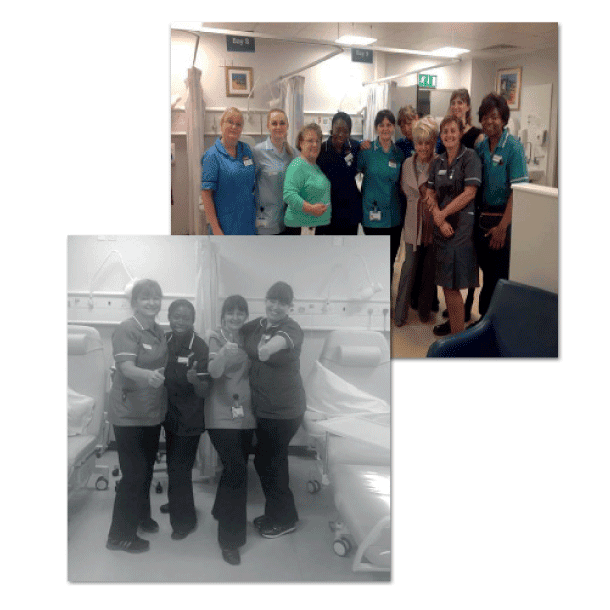Summary
Whittington Health is a small local district general hospital providing care for patients in Islington and Haringey. Oncology services work alongside site-specific tumour services as well as supporting services at the Royal Free and University College London hospitals. Clinical Nurse Specialists (CNS) are considered fundamental to ensuring patient care is co-ordinated, person-centred and is a mandatory requirement of cancer care; they have been identified as the single most important factor associated with high patient satisfaction scores. The CNS team has utilised its knowledge, expertise and compassionate care to implement elements of the recovery package and improve cancer patient experience.
Challenge
In January 2014 the cancer CNS team had been without a lead nurse for over 12 months and had not met as a working team for over 20 months. Cancer CNS work predominately independently of each other within different tumour types.
Objectives
The overall aim of the team is to improve cancer patient experience. To meet regularly in order to review objectives, share good practice on what is working well within the project and develop strategies to overcome any difficulties.
Solution
A working party was developed to introduce electronic holistic nursing assessments (eHNA) in early 2014. This involved key stakeholders, IT, information governance, lead cancer clinician and CNS team. We were successful in obtaining a Macmillan grant affording the opportunity to obtain Trust iPads for all cancer nursing staff allowing not only eHNA but remote access to all Trust electronic systems – an invaluable asset for our CNS. We commenced eHNA for all tumour types in April 2014. Health and Well-being Events began in the autumn 2014, and now cover Skin Care in Cancer, Benefits, Mindfulness and building confidence, Managing fatigue and Nutrition. The Help Overcoming Problems Effectively (HOPE) course commenced in February 2015, based on a range of theoretical concepts from the areas of positive psychology and cognitive social theory. IT has fully supported the project and is developing a programme for robust monitoring of both self-management and routine monitoring of three tumour types. We have assembled a working party involving MDT members from all three tumour types and meet monthly to review and develop our action plan.
Results
Quarterly performance reports to date show continuous improvements in all our tumour types for completion of eHNA and subsequent care plans. We are leading London Cancer on completed eHNA and care plans for 2014 and are the only Trust reaching the 60% of all newly-diagnosed patients receiving an individualised care plan commissioning target. Macmillan are planning a ‘learn and share’ event for other neighbouring Trusts looking at implementation at Whittington as a successful example. The Cancer CNS team has won the Chief Executive’s team of the month award in March 2015 for excellence regarding implementation of this project. All our health and well-being events are well attended and evaluated. The first four HOPE cohorts have expressed how valuable this programme has been and feedback has been extremely positive. Following on from the delegate feedback we commenced monthly coffee mornings to allow HOPE delegates to meet up and continue supporting one another. Initial feedback from both patients and health professionals has been hugely positive. Action points are presented as ‘You said…we did’ alongside survey results to demonstrate to patients we value all their feedback and, where possible, act upon to make improvements. Standardising survey questions, including patients in the design and mirroring questions to national surveys, has improved their validity. The Cancer Patient Experience Working Party is designing a qualitative observational study to evaluate further patient experience within the outpatient clinics.
Learnings
For initial success and continued sustainability, citizen engagement within cancer services must be valued and respected. If healthcare systems remain structured to a deep-rooted health paradigm they habitually fail to recognise the utmost resource available – namely the patient – who remains a problem to be solved rather than an essential key to the solution. All our working parties developing national and local projects have patient representation.Evaluation
Previous surveys were individualised amongst tumour types but standardising the questions has allowed us to compare and contrast data across the entire cancer service and helped identify which teams could potentially help others. A patient satisfaction survey was developed with patients, ensuring clearer definitions of what was meant by each question and that questions remained applicable to them. Quarterly reports for each tumour type are disseminated to each CNS to present to their respective teams. This promotes recognition of positive real time feedback and allows action development to immediately address any negative concerns. Reports are also displayed in outpatients department, demonstrating open and transparency of data regarding our service.



